ROOTS isn’t a film one watches for enjoyment or entertainment, but for enlightenment and perspective. This was true for the original and doubly so for the remake, which is much more graphic and intense. Some have argued, perhaps too graphic. Though there are scenes I could have gone without watching, I believe the right decisions were made given the current scope of our society. Audiences aren’t nearly as guarded as they were back in the 70s. Today, there is a lot more exposure to graphic violence and gore across various media platforms. So in many ways, the presentation speaks to the world in a language that is well understood and has maximum impact.
Having seen the original ROOTS, I knew I was in for an intense emotional journey from the jump. I settled in and braced myself as the title screen emerged to Alex Haley’s narration (voiced by Laurence Fishburne), which contained the poignant line:
“The two most important days of a man’s life is the day he is born, and when he understands why.”
Shortly thereafter Omoro Kinte (Babs Olusanmokun) appears and meets such an understanding—his newborn son, Kunta Kinte (Malachi Kirby). There is a palpable love and tenderness as the proud parents, Omoro and Binta (Nokuthula Ledwaba) revel in their son’s presence, the air filled with Binta’s soothing and haunting lullaby that would later comfort Kunta in the long days ahead, no doubt filling him with bittersweet nostalgia of simpler times. Omoro holds his newborn son up towards the starry sky and declares:
“Behold! The only thing greater than you!”
It is an act that would reverberate halfway across the world through succeeding generations long after an adolescent Kunta is sold into slavery by a rival clan shortly after completing his rite of passage. Malachi Kirby proves himself a capable and outstanding actor who gives Kunta Kinte great depth, dimension and fire. Kunta’s capture comes shortly after a debate with his parents. He wants to attend university, they want him to adhere to the tradition Mandinka way of life—in which family is paramount.
What follows is an unflinching glimpse of some of the hardships slaves endured during the Middle Passage. Shame, depression, and eventual defiance come over the captured men and women. They plan a mutiny to the harmonic cadence of song and the fervent beating of a drum. A violent crescendo erupts, but is brought to a halt with a single, yet devastating blast. Once on land, Kunta is quickly sold to a plantation owner.
Kunta struggles to adjust to the turn his life has taken, yet his defiance remains constant. Having been taken away from all he knows he clings to his birth name like a shield when the slave owners try to replace it. While it strengthens his dignity, it does nothing to protect his flesh in a reenactment of the iconic scene LeVar Burton made memorable in the original production.
Malachi Kirby had big shoes to fill and did an outstanding job in conveying the transition from steadfast rebel to a fractured spirit. This part earned the most tears from me, not just because of the sheer brutality, but also the symbolism used to convey his fading identity, which he later maintains covertly.
As the years elapse, Kunta isn’t easily deterred and makes several attempts to flee, and even gets far enough to join the British and fight the Americans in the Revolutionary War before his ability to run is literally severed. He finds love with Belle (Emayatzy Corinealdi), the woman who heals him and eventually finds himself on the path of fulfilling his Mandinka destiny in spite of bondage. The Kinte line expands with the birth of his daughter Kizzy, played by (Saniyya Sidney, Emyri Crutchfield, ), to whom he passes down his warrior skills.
Kizzy, a spirited young girl, develops a close friendship with the slave master’s daughter, who teaches her to read and write. Yet, it remains clear that fiery possessiveness lurks beneath Missy’s charity and kindness. This plays out several times, including during their curious adolescent years when Missy states “It’s my right,” referring to her desire to indulge her curiosity regarding the appearance of Kizzy’s womanhood. It’s an unsettling three-word declaration that will later return to haunt, and nearly destroy, Kizzy after she is sold to slave owner Tom Lea (Jonathan Rhys Meyers).
The Kinte bloodline expands anew, via the devastating circumstances Tom inflicts upon her. Their son, Chicken George (Regé-Jean Page), grows to train Tom’s roosters for cockfights. He eventually marries and fathers several children before he is eventually blindsided and sent to England as payment for Tom’s gambling debt.
By the time he returns, twenty years have elapsed and his mother Kizzy (Anika Noni Rose) is dead, his children all grown, some with kids of their own. His wife is weary, yet relieved. In another parallel to Kunta’s life, George heads off to the Civil War to help fight against the Confederates alongside Cyrus (T.I.). Meanwhile, his son Tom (Sedale Threatt, Jr.) assists Nancy Holt (Anna Paquin), fiance and spy against Confederate soldier Frederick Murray (Lane Garrison), son of the current slave owner of George’s family. Nancy and her mute accomplice are killed for their treachery. Even after the Union wins the war, and the slaves were said to be free, they still had to endure loopholes and opposition set forth by those unwilling to let go of the power and way of life to which they’d grown accustomed.
The final moments of this spectacular four-day journey brings viewers full circle with the birth of Tom’s child, the first to be born free. Tom inquires how to name his daughter the right way, seeking to follow the tradition of his forefathers. As the scene fades, the late Alex Haley, seated at his desk, reflects on his ancestors, who appear before him against the backdrop of their respective eras. The boundaries of time dissolve as Haley joins them all in the great beyond. Powerful, profound, breathtaking, and devastatingly beautiful.
ROOTS has led me to ponder the heartbreak that befell, and is currently befalling, so many families around the globe as a result of slavery; a crisis that’s still very much alive today. It successfully conveyed the aftershock of devastation endured by those no longer alive to tell their tales. This production was met with much controversy. It has been said that the topic of slavery is being used to further oppress the descendants of those who endured it. Upon watching ROOTS from beginning to end, I was reminded that my ancestors endured subhuman treatment with superhuman strength and that such strength is carried on through the succeeding generations, including the present. Though my spirit weeps for what my ancestors went through, I feel empowered by their immense fortitude.
The aim of LeVar Burton, Mark Wolper, and their team was for this incarnation of ROOTS to inspire a national discussion about the topic, especially since our culture is still experiencing the same hate and ignorance that contributed to the profitability and popularity of slavery. I believe they’ve succeeded.

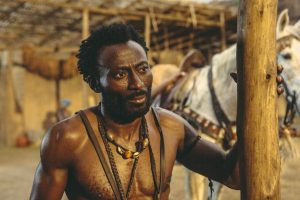
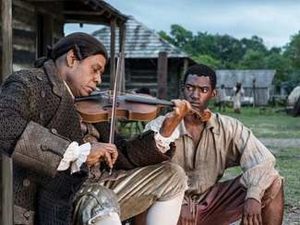
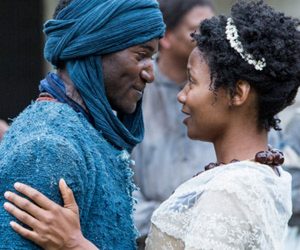
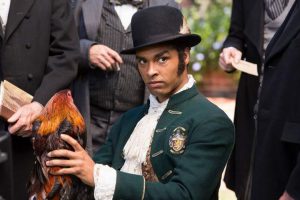
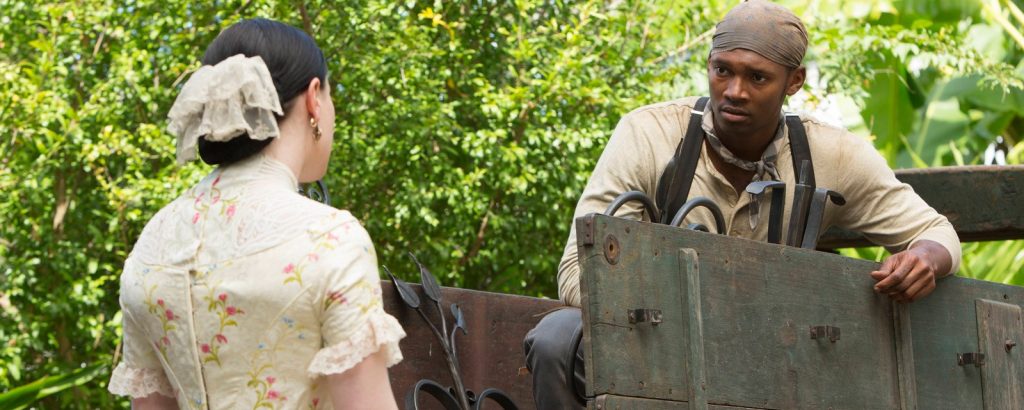
Nice job Kia!